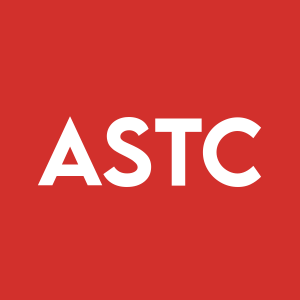TSA Grants 1st Detect’s TRACER 1000 Acceptance onto the “Approved” Section of the Air Cargo Security Technology List
Rhea-AI Summary
Astrotech (NASDAQ: ASTC) and its subsidiary, 1st Detect , have announced that their TRACER 1000 has been approved by the U.S. Transportation Security Administration (TSA) for inclusion on the Air Cargo Security Technology List (ACSTL). This allows the TRACER 1000 to advance to Stage II testing, aiming for eventual qualification on the ACSTL. The TRACER 1000, known for its near-zero false alarms due to its advanced mass spectrometry technology, is already in use at airport cargo and passenger checkpoints in 14 countries, following its 2020 certification by the European Civil Aviation Conference (ECAC). CEO Tom Pickens highlighted this milestone as a significant step for entering the U.S. regulated air cargo market and progressing TSA passenger checkpoint approval.
Positive
- TRACER 1000 approved by TSA for Air Cargo Security Technology List (ACSTL).
- Advancement to Stage II testing for TRACER 1000.
- TRACER 1000 achieves near-zero false alarms.
- TRACER 1000 already used in 14 countries after ECAC certification in 2020.
- Potential to penetrate U.S. air cargo market.
Negative
- None.
News Market Reaction 1 Alert
On the day this news was published, ASTC declined NaN%, reflecting a moderate negative market reaction.
Data tracked by StockTitan Argus on the day of publication.
Austin, Texas, June 20, 2024 (GLOBE NEWSWIRE) -- Astrotech Corporation (NASDAQ: ASTC) ("Astrotech" or the "Company") and its wholly-owned subsidiary, 1st Detect Corporation, announce that the U.S. Transportation Security Administration (“TSA”) has approved the TRACER 1000™ for the Air Cargo Security Technology List (“ACSTL”). This action advances the TRACER 1000 to Stage II testing, whereupon successful completion of field testing will move it to the “Qualified” section on the ACSTL. This approval was awarded after the TRACER 1000 was thoroughly assessed by the TSA QG2 Technical Review Panel (“TRP”). Regulated parties in the U.S., such as the air cargo market, which are required to utilize the ACSTL can now purchase the TRACER 1000.
The Astrotech TRACER 1000 Mass Spectrometer Technology™ (“AMS Technology”) is now being used at both airport cargo and passenger checkpoints in fourteen countries after being certified by the European Civil Aviation Conference (“ECAC”) in 2020. ECAC is analogous to the TSA in the U.S. Mass spectrometry is recognized as the gold standard in chemical analysis because of its ultra-high vacuum that eliminates competing chemicals that can cause expensive false alarms. As a result, the TRACER 1000 achieves near-zero false alarms.
Tom Pickens, CEO and CTO of Astrotech, said: “Being listed as ‘approved’ on the ACSTL is an important milestone for the Company. We are now the first and only mass spectrometer ETD on the ACSTL. We look forward to selling the TRACER 1000 to the regulated air cargo market in the United States as we continue to strengthen our domestic sales efforts. Also, we received a Cooperative Research and Development Agreement ("CRADA") from the TSA that advances the Company to the next step in the ongoing TSA passenger checkpoint approval process. All of this is very exciting to be on the path to opening both the domestic cargo and domestic checkpoint markets.”
About Astrotech Corporation
Astrotech (Nasdaq: ASTC) is a mass spectrometry company that launches, manages and commercializes scalable companies based on its innovative core technology through its wholly-owned subsidiaries. 1st Detect develops, manufactures, and sells trace detectors for use in the security and detection market. AgLAB develops and sells chemical analyzers for use in the agriculture market. Pro-Control is developing mass spectrometry technology for use in chemical manufacturing processes. BreathTech is developing a breath analysis tool to screen for volatile organic compounds that could indicate infections or critical conditions. Astrotech is headquartered in Austin, Texas. For information, please visit www.astrotechcorp.comwww.astrotechcorp.com.
Forward-Looking Statements
This press release contains forward-looking statements that are made pursuant to the Safe Harbor provisions of the Private Securities Litigation Reform Act of 1995. Such forward-looking statements are subject to risks, trends, and uncertainties that could cause actual results to be materially different from the forward-looking statement. These factors include, but are not limited to, the adverse impact of inflationary pressures, including significant increases in fuel costs, global economic conditions and events related to these conditions, including the ongoing wars in Ukraine and the Middle East and the COVID-19 pandemic, the Company’s use of proceeds from the common stock offerings, whether we can successfully complete the development of our new products and proprietary technologies, whether we can obtain the FDA and other regulatory approvals required to market our products under development in the United States or abroad, whether the market will accept our products and services and whether we are successful in identifying, completing and integrating acquisitions, as well as other risk factors and business considerations described in the Company’s Securities and Exchange Commission filings including the Company’s most recent Annual Report on Form 10-K. Any forward-looking statements in this document should be evaluated in light of these important risk factors. While we do not intend to directly harvest, manufacture, distribute or sell cannabis or cannabis products, we may be detrimentally affected by a change in enforcement by federal or state governments and we may be subject to additional risks in connection with the evolving regulatory area and associated uncertainties. Any such effects may give rise to risks and uncertainties that are currently unknown or amplify others mentioned herein. Although the Company believes the expectations reflected in its forward-looking statements are reasonable and are based on reasonable assumptions, no assurance can be given that these assumptions are accurate or that any of these expectations will be achieved (in full or at all) or will prove to have been correct. Moreover, such statements are subject to a number of assumptions, risks and uncertainties, many of which are beyond the control of the Company, which may cause actual results to differ materially from those implied or expressed by the forward-looking statements. In addition, any forward-looking statements included in this press release represent the Company’s views only as of the date of its publication and should not be relied upon as representing its views as of any subsequent date. The Company assumes no obligation to correct or update these forward-looking statements, whether as a result of new information, future events or otherwise, except as required by applicable law.








